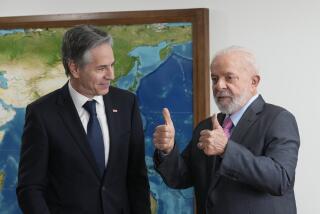Civilian Government Will Inherit an Economic Mess : No Painless Choices Open to Brazil on Debt
- Share via
RIO de JANEIRO — The crisis in Brazil’s relations with the International Monetary Fund that has halted negotiations on refinancing Brazil’s $100-billion foreign debt, confronts the civilian government that is to take office next month with painful choices.
President-elect Tancredo Neves has said he wants to contain Brazil’s surging inflation and meet debt payments. But he has said, too, that he wants to achieve this without applying recessionary fiscal, credit and wage policies.
Led by exports, Brazil’s economy grew more than 4% last year after two years of declining output and growing unemployment. But the economic recovery was accompanied by persistent inflation that raised prices 227% last year. This performance violated one of the basic conditions of a stabilization agreement under which the IMF made available $4.5 billion to Brazil over a three-year period that began in 1983.
The IMF last week suspended further drawings by Brazil on the $1.6 billion left in that fund because Brazil failed to meet commitments to reduce public deficits and monetary expansion.
This suspension has the makings of a serious political dispute over the IMF’s insistence on tight monetary policy and reduction of credit. Such austerity measures could lead to the recession that Neves has said he will not accept.
But an agreement with the IMF on a stabilization program for this year is essential for refinancing Brazil’s foreign debt. Negotiations have been under way since November with the creditor banks on refinancing $45 billion in debt coming due between now and 1991.
The negotiations were suspended after Jacques de Larosiere, managing director of the IMF, sent telex messages to the banks declaring that the outgoing government of President Joao Figueiredo had violated monetary and credit ceilings, leading to a level of inflation that was incompatible with the IMF program.
Despite inflation at record levels, Brazil’s external accounts improved strongly last year. With exports rising to $27 billion, there was a trade surplus in excess of $12 billion. Reserves rose to about $7 billion, which is equal to about six months of imports.
The internal financial picture, however, is in deep disorder. Under the IMF agreement, monetary expansion was to increase no more than 90% last year as a key element in reducing inflation to 130%. Instead, a surge of new paper money in December pushed the monetary expansion to 150%.
This disorder has continued in the first two months of this year. The government has had to make extraordinary disbursements to cover the bankruptcy of a major commercial bank in the state of Rio Grande do Sul and a mortgage institution. Further outlays have been provoked by a financial crisis in the shipbuilding industry, which has accumulated foreign debts of more than $500 million while orders for new ships are being canceled.
Negotiations on a new IMF program now fall to the new government, which will take office March 15. The new minister of finance, who will tackle the IMF negotiations, is expected to be Francisco Dornelles, a tax expert who has been director of internal revenue in the present government and is a nephew of the incoming president.
Neves is committed to a program of public spending on small projects and low-cost housing that is supposed to provide 800,000 new jobs this year. He has also said that wages will not be reduced because workers have “already made the major sacrifices” by accepting wage restrictions below the level of inflation.
Thus, it is not clear where the cuts will come from to eliminate the public deficits.
Gazeta Mercantil, Brazil’s leading business publication, said in an editorial: “Given his commitments, Neves cannot enter into an agreement with the IMF that is strongly contractionary. The future agreement has to . . . allow for reasonable economic growth.”
Since the debt crisis began in 1982, Brazil has signed seven “letters of intent” with the IMF covering the conditions required by the IMF. But all these commitments have been violated, and have had to be renegotiated.
In practice, Brazil has pledged to meet goals that could not be attained because IMF approval was the key to obtaining loans from the international banks. For every dollar obtained from the IMF, the banks provided seven.
Now, however, the new administration says it does not want to sign agreements with the IMF or creditor banks that it cannot keep.
More to Read
Sign up for Essential California
The most important California stories and recommendations in your inbox every morning.
You may occasionally receive promotional content from the Los Angeles Times.













